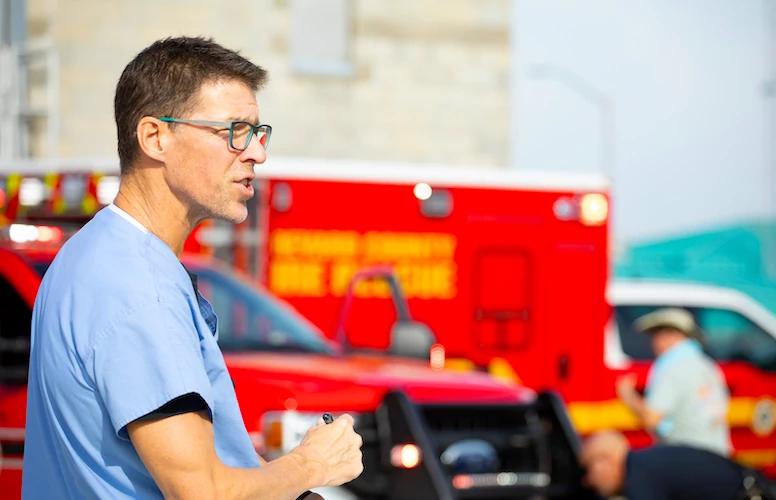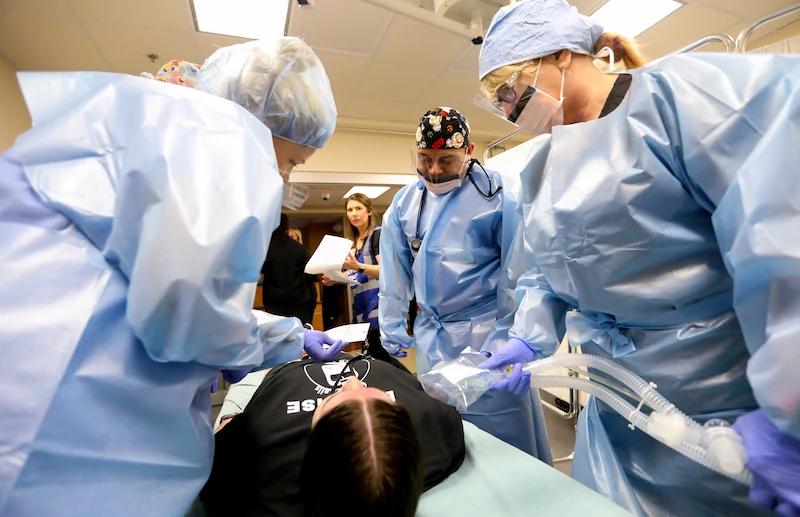Space Coast's Only Level II Trauma Center Hosts Advanced Trauma Life Support Training Program
This past month, Health First successfully conducted an Advanced Trauma Life Support (ATLS) training program at Holmes Regional Medical Center. Above, Health First Trauma Surgeon Dr. Scott Zenoni monitors activities during a recent regionwide, multi-agency disaster training drill at Port Canaveral.
For more than 25 years, Health First’s Holmes Regional Medical Center has proudly served as Brevard’s only Level II Trauma Center. And its trauma professionals work closely alongside First Flight, Brevard Fire Rescue, and Emergency Medical Services to rapidly deliver life-saving care for more than 650,000 Space Coast residents and visitors when every minute matters.
This past month, Health First successfully conducted an Advanced Trauma Life Support (ATLS) training program at Holmes Regional Medical Center.
The ATLS-recognized training program was developed by the American College of Surgeons and provides a systematic approach to the immediate management of trauma patients.
It emphasizes a rapid, structured assessment and resuscitation of injured patients, focusing on life-threatening conditions first. The ATLS program is run by Health First’s Trauma Medical Director, Dr. Scott Zenoni, and coordinated by Trauma Program Manager Heather Ouellette.
“As the region’s only trauma program, it is part of our mission, duty and culture at Health First to incorporate hands-on training – including lectures by our Trauma Surgeons and hands on skill stations run also by our trauma surgeons, with Trauma Hal, our life size full-body trauma patient simulator allowing students to gain hands on skills of performing lifesaving techniques such as cricothyrotomies, intubation, as well as inserting chest tubes, etc.,” said Ouellette.
“We were honored this year to serve and host students who flew in from various states – including one from Louisiana’s Air National Guard Reserve Unit. Our class sizes are purposely kept small to ensure adequate training of a 1:4 instructor-to-student ratio, which makes this program even more hands-on, impactful, and engaging,” Ouellette continued.
This past month, Health First successfully conducted an Advanced Trauma Life Support (ATLS) training program at Holmes Regional Medical Center. Above, Health First Trauma team responds to a “mock” patient during a recent full-scale disaster drill at Holmes Regional Medical Center.
Trauma experts consistently emphasize the critical importance of the ‘golden hour’ – that initial 60 minutes after traumatic injury.
Studies have shown that timely access to specialized trauma care within this window dramatically improves survival rates and long-term recovery outcomes. This research underscores why rapid treatment from our first responders, trauma surgeons, nurses, and air crews makes a life-saving difference.
According to the American Association for the Surgery of Trauma (AAST) traumatic injury is considered a major public health problem. In the United States, injuries account for over 150,000 deaths and over 3 million non-fatal injuries per year. Around the world, injury is responsible for more than 5 million deaths per year. Many millions more are injured.
The events that result in injury are not random or unpredictable. Injury can be prevented, and many lives can be saved by learning more about the causes of injury and implementing appropriate injury prevention strategies. Many of these strategies are well-established, readily available, and relatively inexpensive, such as seat belts and helmets.

